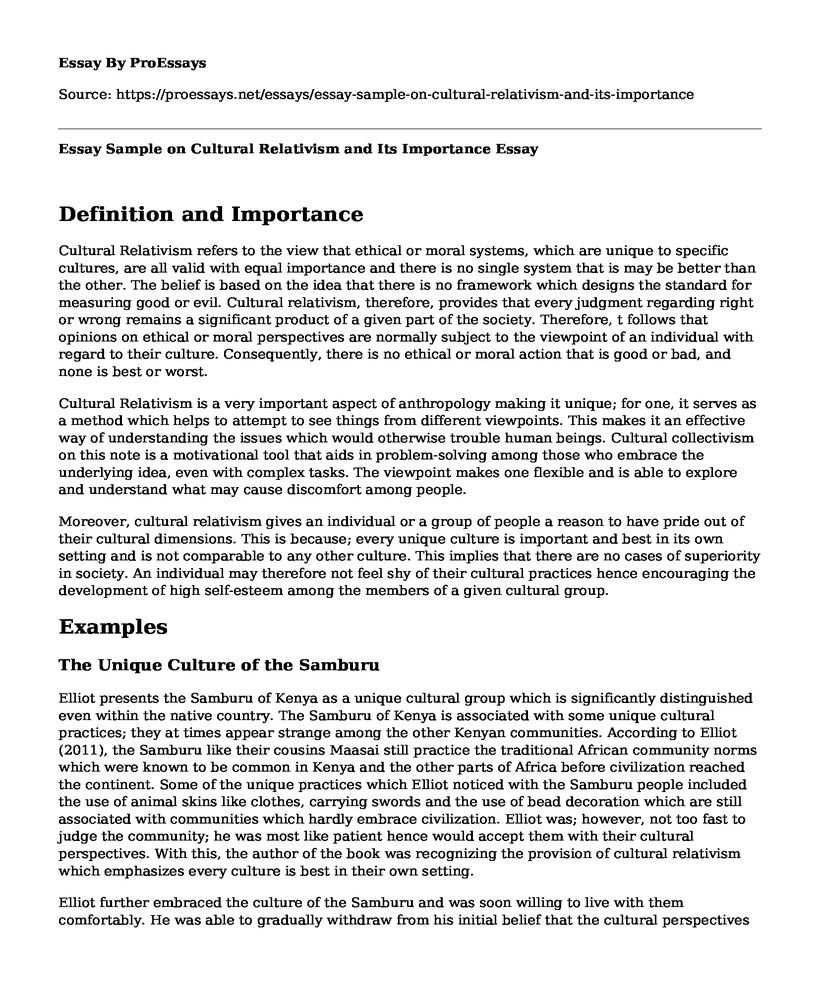Definition and Importance
Cultural Relativism refers to the view that ethical or moral systems, which are unique to specific cultures, are all valid with equal importance and there is no single system that is may be better than the other. The belief is based on the idea that there is no framework which designs the standard for measuring good or evil. Cultural relativism, therefore, provides that every judgment regarding right or wrong remains a significant product of a given part of the society. Therefore, t follows that opinions on ethical or moral perspectives are normally subject to the viewpoint of an individual with regard to their culture. Consequently, there is no ethical or moral action that is good or bad, and none is best or worst.
Cultural Relativism is a very important aspect of anthropology making it unique; for one, it serves as a method which helps to attempt to see things from different viewpoints. This makes it an effective way of understanding the issues which would otherwise trouble human beings. Cultural collectivism on this note is a motivational tool that aids in problem-solving among those who embrace the underlying idea, even with complex tasks. The viewpoint makes one flexible and is able to explore and understand what may cause discomfort among people.
Moreover, cultural relativism gives an individual or a group of people a reason to have pride out of their cultural dimensions. This is because; every unique culture is important and best in its own setting and is not comparable to any other culture. This implies that there are no cases of superiority in society. An individual may therefore not feel shy of their cultural practices hence encouraging the development of high self-esteem among the members of a given cultural group.
Examples
The Unique Culture of the Samburu
Elliot presents the Samburu of Kenya as a unique cultural group which is significantly distinguished even within the native country. The Samburu of Kenya is associated with some unique cultural practices; they at times appear strange among the other Kenyan communities. According to Elliot (2011), the Samburu like their cousins Maasai still practice the traditional African community norms which were known to be common in Kenya and the other parts of Africa before civilization reached the continent. Some of the unique practices which Elliot noticed with the Samburu people included the use of animal skins like clothes, carrying swords and the use of bead decoration which are still associated with communities which hardly embrace civilization. Elliot was; however, not too fast to judge the community; he was most like patient hence would accept them with their cultural perspectives. With this, the author of the book was recognizing the provision of cultural relativism which emphasizes every culture is best in their own setting.
Elliot further embraced the culture of the Samburu and was soon willing to live with them comfortably. He was able to gradually withdraw from his initial belief that the cultural perspectives of the Samburu were superior to those of the communities in Kenya and the world at large. The author, who was just a foreigner, settled in the Samburu land and considered a good place to live. Consequently, he later concluded that no culture is inferior as well as no superior culture (Fratkin, 2011). Every culture is the best if an individual understands what the practices mean uniquely within the given setting.
Personal Experience
I have experienced a number of instances the concept of cultural relativism in my life, at which points I had to accept the cultural perspectives even if some appeared strange. One of such cases was when I met a Japanese person with whom I held a brief business meeting. I began by explaining my point of view then I would allow the Japanese person to contribute what he was thinking with regard to the business idea. At some points, we had to respond to what the other had initially said. However, I noticed that the Japanese were a little slower to respond to my contributions than I was to his suggestion. It would be easy for someone to feel that he lacked what to say when he remained quiet most of the time; however, this was due to some level of difference in cultural perspectives.
I realized that in the Japanese culture, people do not immediately respond to others as they feel that they need some time to think over an issue. It is common among the Japanese people to hold their opinion close to their chest as they get the message. They take the message home, take time to think about it and later come back with an answer that is well thought out. This reflects the provisions of cultural relativism in which different form s of reactions occur out of a single action in a meeting. His perspectives are just the best concerning their cultural provisions. Similarly, mine is also the best to me, and therefore we could not compare them to draw conclusions based on superiority.
References
Fratkin, E. (2011). Laibon: An Anthropologist's Journey with Samburu Diviners in Kenya (1st ed.). AltaMira Press.
Cite this page
Essay Sample on Cultural Relativism and Its Importance. (2022, Nov 15). Retrieved from https://proessays.net/essays/essay-sample-on-cultural-relativism-and-its-importance
If you are the original author of this essay and no longer wish to have it published on the ProEssays website, please click below to request its removal:
- Removal of Indian Names and Mascots in Sports Teams
- Minorities in Policing Essay Example
- The Impact of Ethnic Conflict on Myanmar Paper Example
- Essay on Organization of Sporting Events for Success: Football Guidelines
- Essay on Long Day's Journey: A Family's Struggles & Resentments
- American Indians: Uncovering the Impact of Western Civilization on Identity - Essay Sample
- Paper Example on Female Muslim Patient Refusal: Understanding Cultural Diversity in Hospital Care







